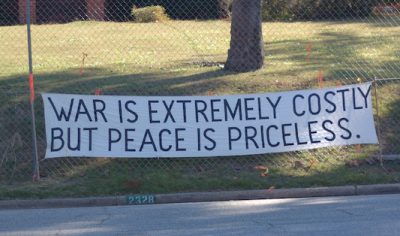“Peace or Nuclear War”. Albert Schweitzer’s “Appeal to Humanity” Then and Today

All Global Research articles can be read in 51 languages by activating the “Translate Website” drop down menu on the top banner of our home page (Desktop version).
To receive Global Research’s Daily Newsletter (selected articles), click here.
Visit and follow us on Instagram, Twitter and Facebook. Feel free to repost and share widely Global Research articles.
First published on June 29, 2022
***
The German-French Nobel Peace Prize winner, pacifist and “jungle doctor” Albert Schweitzer was one of the most important thinkers of the 20th century. His philosophical thinking was based on the assumption that when people reflect on themselves and their limits, they mutually recognise each other as brothers who reflect on themselves and their limits. In the course of the process of civilisation, solidarity, which was originally only related to one’s own tribe, would gradually be transferred to all, including unknown people. In the 1950s, Schweitzer’s doctrine of “reverence for life” was a moral authority, a guiding principle in the struggle against the nuclear armament of nations.
Image on the right: Albert Schweitzer (Licensed under CC BY-SA 3.0 de)

But the general consciousness of individuals and peoples has not yet found an answer to the “Cain question” from biblical prehistory: “Am I my brother’s keeper? Once again, the catastrophe of a nuclear war threatens us as it did in Albert Schweitzer’s time almost 70 years ago. That is why his “Appeal to Humanity” – which can be read in the collection of writings “Peace or Nuclear War” (1) – has lost none of its topicality.
Bertha von Suttner: “Lay Down Your Arms!”
Never before could the problems of peoples be solved by the method of violence, war. This is no different today than in the history of mankind so far. The backslide into war is a backslide into barbarism, which makes itself felt in all areas of social life: it causes unspeakable suffering in the lives of individuals as well as peoples. The daily TV images of the war in Ukraine give us a lasting impression of this suffering.
Today’s wars are no longer responsible, they have become obsolete. Even the First World War was no longer a conventional war, it was genocide. Since then, the illegal wars of aggression have become even more murderous, more insidious, more widespread, more genocidal.
For the Austrian cultural historian Friedrich Heer, these wars are preparations for the “final solution of the human question” or, as Bertha von Suttner prophesies in her novel “Lay down your arms!”: “The downfall for all” (2). This is certainly true for a universally feared war with nuclear weapons.
Mahatma Gandhi wrote in a letter to Bertha von Suttner after the publication of the novel:
“God grant that the abolition of war may follow your works.” (3)
Alfred Nobel was inspired by Bertha von Suttner to endow the Nobel Peace Prize in his will (4).
History – a work of man
We know today that war is a calamity. We also know that its cause is not “human nature” but the injustice and inhumanity of our social order. This fact must not make us forget that history is a work of man and that man must be changed if the world is to be changed. Accordingly, enlightenment and education are the most important measures that can be taken against war.
We cannot yet say when the conscience of humanity, whose cry of admonition goes through the centuries, will finally make itself heard. But we have no doubt that the existence of the human race hangs on the question of whether people will profess all-human solidarity to a far greater extent than they have done up to now.
*
Note to readers: Please click the share buttons above or below. Follow us on Instagram, Twitter and Facebook. Feel free to repost and share widely Global Research articles.
Dr. Rudolf Lothar Hänsel is a teacher (retired headmaster), doctor of education (Dr. paed.) and graduate psychologist (specialising in clinical, educational and media psychology). As a retiree, he worked for many years as a psychotherapist in his own practice. In his books and educational-psychological articles, he calls for a conscious ethical-moral values education and an education for public spirit and peace.
He is a regular contributor to Global Research.
Notes
(1) Schweitzer, A. (1984). Peace or nuclear war. Munich
(2) Heer, F. In: Von Suttner, B. (1977). Lay down your arms! Introduction, p. VII
(3) op. cit., p. XIV
(4) op. cit.
Featured image is licensed under CC BY SA 2.0

